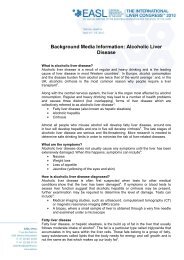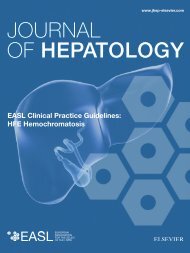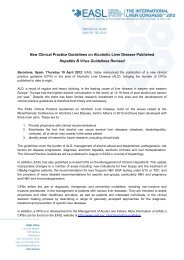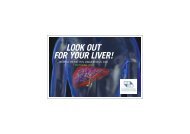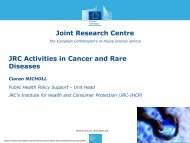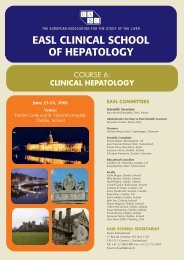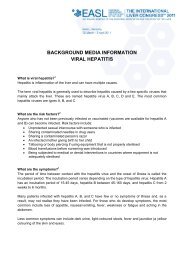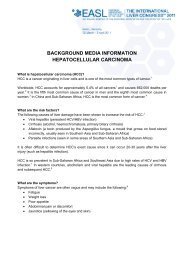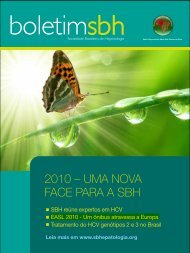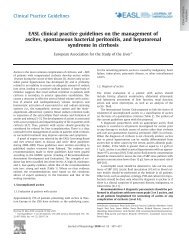barcelona . spain - European Association for the Study of the Liver
barcelona . spain - European Association for the Study of the Liver
barcelona . spain - European Association for the Study of the Liver
Create successful ePaper yourself
Turn your PDF publications into a flip-book with our unique Google optimized e-Paper software.
BARCELONA . SPAIN<br />
36 POSTGRADUATE COURSE SYLLABUS ALCOHOLIC LIVER DISEASE 37<br />
APRIL 18 - 19/2012 THE INTERNATIONAL LIVER CONGRESS TM 2012<br />
These are TNFα -238A (10) and PNPLA3 rs738409, <strong>of</strong> which only <strong>the</strong> latter is supported by robust and<br />
unequivocal data (Table 2). Toge<strong>the</strong>r, data on PNPLA3 allow <strong>for</strong> <strong>the</strong> conclusion that PNPLA3 rs738409 GG<br />
carriers represent a genetically defined subpopulation <strong>of</strong> high risk subjects susceptible to progression <strong>of</strong><br />
clinically inapparent to overt ALD. Whe<strong>the</strong>r PNPLA3 genotype represents a marker that will assist decisionmaking<br />
in clinical practice remains to be shown, as well as whe<strong>the</strong>r it could serve as a <strong>the</strong>rapeutic target.<br />
Table 2<br />
<strong>Study</strong> Design Patients Results<br />
Tian et al. *<br />
Seth et al. *<br />
Trépo et al. *<br />
Stickel et al. *<br />
Genetic case control<br />
482 cases (alcoholic<br />
cirrhosis) (Mestizo<br />
subjects with strong<br />
ethnic heterogeneity)<br />
Genetic case control<br />
(British<br />
Caucasians)<br />
Genetic case control<br />
(Belgium Caucasians)<br />
Genetic case control<br />
(German Caucasians)<br />
482 cases (alcoholic cirrhosis)<br />
434 non-cirrhotic ALD<br />
305 alcoholics w/o liver<br />
enzyme elevations<br />
266 cases (alcoholic cirrhosis)<br />
182 controls (heavy drinkers<br />
w/o clinical ALD)<br />
330 cases (97% biopsyproven<br />
ALD; 263 cirrhotics)<br />
328 controls (healthy<br />
individuals without ALD)<br />
Multicenter sample with 1,043<br />
alcoholics (210 cirrhosis,<br />
394 non-cirrhotic ALD, 439<br />
alcoholic controls<br />
Population-based sample<br />
with 376 alcoholics (269 noncirrhotic<br />
ALD, 107 alcoholic<br />
controls)<br />
Non-alcoholic healthy<br />
subjects (n=162)<br />
rs738409 GG associated with cirrhosis<br />
when compared to controls (OR 2.25, 1.74-<br />
2.9; 1.7 x 10 -10 ) and to non-cirrhotic ALD<br />
(OR 1.43, 1.15-1.78, 1.0 x 10 -3 )<br />
<strong>Association</strong> robust after ancestry correction<br />
(OR 1.81, 1.36-2.41; 4.7 x 10 -5 )<br />
rs738409 G homozygosity associated with<br />
alcoholic cirrhosis (OR 7.34, 2.19-24.52,<br />
p=0.0012)<br />
Carriage <strong>of</strong> rs738409 G allele associated<br />
with alcoholic cirrhosis (OR 1.95, 1.34-<br />
2.84, p=0.00002)<br />
rs738409 G associated with ALD (OR 1.54;<br />
1.12-2.11, p=0.008) and alcoholic cirrhosis<br />
(OR 2.08; 1.15-3.77, p=0.02)<br />
PNPLA mRNA expression inversely<br />
correlated with cirrhosis and portal<br />
pressure<br />
Genotype rs738409 GG associated with<br />
alcoholic cirrhosis (OR 2.79, 1.55-5.04,<br />
p=1.18 x 10 -5 , cirrhosis vs. controls)<br />
Genotype rs738409 GG associated with<br />
alanine aminotransferase elevation (OR<br />
2.33, 1.27-4.26, p=0.0085)<br />
Confirmation <strong>of</strong> association in separate<br />
replication sample (OR 4.75, 1.08-20.9,<br />
p=0.04, ALD vs alcoholic controls)<br />
Population-attributable risk <strong>of</strong> rs738409 to<br />
cirrhosis 26.6%<br />
However, still lacking are data from genome-wide analyses in ALD patients similar to what has been carried<br />
out in o<strong>the</strong>r chronic liver diseases. Conducting this kind <strong>of</strong> global scan would not only help to confirm PNPLA3<br />
rs738409 as an important susceptibility marker <strong>of</strong> ALD, but also potentially identify novel, yet unkown genetic<br />
variants <strong>for</strong> better screening <strong>of</strong> patients, and subsequent clinical and experimental research. Despite <strong>the</strong><br />
noted limitations, functional pathway in<strong>for</strong>mation and <strong>the</strong> genetic risk factors <strong>of</strong> ALD start to converge into a<br />
common etiopathogenetic concept allowing <strong>for</strong> a better understanding <strong>of</strong> this serious disorder in <strong>the</strong> future.<br />
REFERENCES<br />
Bellentani S, Saccoccio G, Costa G, et al. Drinking habits as c<strong>of</strong>actors <strong>of</strong> risk <strong>for</strong> alcohol<br />
induced liver damage. Gut 1997;41:845-850.<br />
Fattovich G, Str<strong>of</strong>folini T, Zagni I, Donato F. Hepatocellular carcinoma in cirrhosis: incidence and<br />
risk factors. Gastroenterology 2004;127(5 Suppl 1):S35-50.<br />
Corrao G, Bagnardi V, Zambon A, La Vecchia C. A meta-analysis <strong>of</strong> alcohol consumption and <strong>the</strong><br />
risk <strong>of</strong> 15 diseases. Prev Med 2004;38:613-619.<br />
Stokkeland K, Hilm G, Spak F, et al. Different drinking patterns <strong>for</strong> women and men with alcohol<br />
dependence with and without alcoholic cirrhosis. Alcohol Alcohol 2008;43:39-45.<br />
Mathurin P, Deltenre P. Effect <strong>of</strong> binge drinking on <strong>the</strong> liver: an alarming public health issue Gut<br />
2009;58:613-17.<br />
Raynard B, Balian A, Fallik D, et al. Risk factors <strong>of</strong> fibrosis in alcohol-induced liver disease.<br />
Hepatology 2002;35:635-8.<br />
Monto A, Patel K, Bostrom A, et al. Risks <strong>of</strong> a range <strong>of</strong> alcohol intake on hepatitis C-related<br />
fibrosis. Hepatology 2004;39:826-34.<br />
Sato N, Lindros KO, Baraona E, et al. Sex difference in alcohol-related organ injury. Alcohol Clin<br />
Exp Res 2001;25:40S-45S.<br />
Gleeson D, Evans S, Bradley M, et al. HFE genotypes in decompensated alcoholic liver disease:<br />
phenotypic expression and comparison with heavy drinking and with normal controls. Am<br />
J Gastroenterol 2006;101:304-10.<br />
Marcos M, Gómez-Munuera M, Pastor I, et al. Tumor necrosis factor polymorphisms<br />
and alcoholic liver disease: a HuGE review and meta-analysis. Am J Epidemiol 2009;<br />
170:948-56. Stickel F, Hampe J. Genetic determinants <strong>of</strong> alcoholic liver disease.<br />
Gut 2012;61:150-9.<br />
* For full reference, please see ref. 11.



